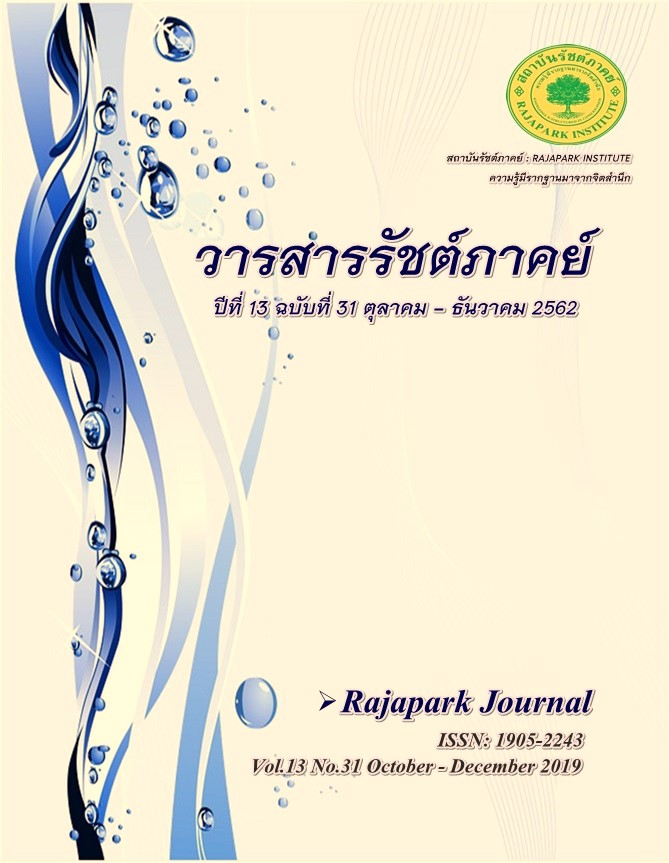Factors Influencing Organizational Commitment of Personnel in Educational Command Office Royal Thai Police
Main Article Content
Abstract
In this research, the researcher studies (1) the levels at which employees of the Police Education Bureau opinions of factors governing organizational commitment and the organizational commitment of these employees. In addition, the researcher examines (2) the relationships between these factors and the organizational commitment of the employees. Finally, furthermore, the researcher (3) determines the influence of these factors as they exert effects on the organizational commitment of the employees. The sample population consisted of 300 employees of the Police Education Bureau. A questionnaire was used as a research instrument to collect germane data. Using techniques of descriptive statistics, the researcher analyzed the data collected in terms of frequency, percentage, mean, and standard deviation. Pearson’s product moment correlation coefficient (PPMCC) method and stepwise multiple regression analysis were also employed by the researcher. Findings are as follows: 1. The employees exhibited the opinions toward factors exerting effects on organizational commitment overall at a high level. When considered in each aspect, it was found that the mean was at a high level for four aspects: First were work relationships and job satisfaction. Next in descending order were job characteristics and leadership. The mean was at a moderate level in two aspects: having the opportunity for advancement and professional development and total compensation.The organizational commitment of the employees overall was evinced at a moderate level. Furthermore, the aspects-viz., normative commitment, affective commitment, and continuous commitment were also displayed at a moderate level. 2. Factors exerting effects on organizational commitment in the aspect of leadership exhibited positive relationships at a high level with the organizational commitment of the employees at the statistically significant level of .05. The factors exerting effects on organizational commitment viz., job satisfaction, having the opportunity for advancement and professional development, job characteristics, and total compensation showed moderate positive relationships with organizational commitment at the statistically significant level of .05. The factor qua aspect of work relationships showed a positive relationship with organizational commitment at the statistically significant level of .05. 3.The five variables that were explanatory of factors influencing the organizational commitment of the employees at the statistically significant level of .05 were leadership, having the opportunity for advancement and professional development, job satisfaction, total compensation, and job characteristics. All of these factors displayed the multiple correlation coefficient at (R) = 0.840 and were explanatory at 70.10 percent (R2 Adjusted = 0.701). The factor of work relationship did not influence the organizational commitment of the employees.
Article Details

This work is licensed under a Creative Commons Attribution-NonCommercial-NoDerivatives 4.0 International License.
Views and opinions appearing in the Journal it is the responsibility of the author of the article, and does not constitute the view and responsibility of the editorial team.
References
Burke, Inc. (2016). Research Employee Engagement & Retention Management. Retrieved June 20, 2019, from http://www.burke.com/Services/EERM/services.cfm?.id=180
Hewitt Associates. (2004). Employee engagement: Why it matters and what you can do about it. Chicago, IL.
Kaewmanee, S. (2006). Employee Engagement. People Magazine, 27(3), 10-16.
Kecharananta, N. (2008). Organizational behavior. Bangkok: SE-EDUCATION.
Kongkasawat, T. (2007). Will strengthen the bond of people towards the organization. For Quality Magazine, 13(112), 51–54.
Loke, C. F. (2001). Leadership behaviors: Effect on job satisfaction, productivity, and organizational commitment. Journal of Nursing Management, 9(4), 191-204.
Mungkhang, A. (2014). Factors affecting the organizational commitment of employees: a case study of employees at a hotel in Bangkok. Master of Business Administration Thesis, Ramkhamhaeng University.
Nimnuan, C. (2008). Factors Relating to Organizational Commitment of TNT (Thailand) Company Limited. Master of Business Administration Thesis, Phra Nakhon Rajabhat University.
Pongvarin, T. (2014). The company grows with employee engagement. Bangkok: Think Publishing Beyond Books.
Richard, M. (2007). The practice of engagement. Strategic HR Review, 6(1), 16-17.
Robertson, M. B. (2019). Employee engagement in the goal-setting process: Can employee engagement theory improve the goal-setting process?. Doctoral dissertation, University of Liverpool.
Sangoiem, P. (2015). Factors Affecting Job Satisfaction and Organizational Commitment of Academic Support Personnel at the National Institute of Development Administration. Master of Business Administration Thesis, Ramkhamhaeng University.
Saritwanich, S. (2006). Modern organizational behavior: concepts and theories. Bangkok: Thammasat University.
Watson, W. (2000). A survey finds seven factors that drive employee commitment. Retrieved April 12, 2019, from http://compensation.blr.com


